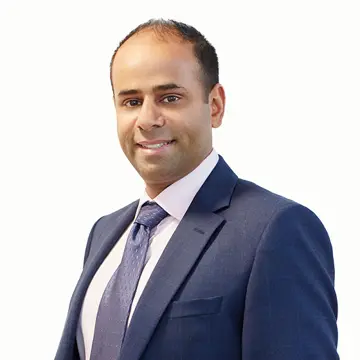
Mr Romil Patel is a Consultant Ophthalmic Surgeon at Moorfields Eye Hospital NHS Foundation Trust and Moorfields Private as well as Training Director of Emergency Services at the Trust. Mr Patel trains and supervises local and international junior surgeons in both routine and complex cataract procedures.
What are your areas of expertise?
- Cataract surgery (including multi focal intra ocular lenses)
- Conjunctivitis
- Corneal abrasion
- Dry eye
- Blepharitis
What are your responsibilities as the Training Director of Emergency Services at the Trust?
We offer a world class emergency service led by a dedicated consultant body. It is my role to ensure that all our junior staff work in a well supported and nurturing environment in order to develop their skills. We have a number of excellent registrars and optometrist working in the department and they have specific requirements in order to progress to the next level. It is my duty to make sure that they have every opportunity to meet those goals in a safe and practical manner.
video transcript
The rapid access clinic is a reflection on really what we do in the accident and emergency service in the NHS. It is a consultant delivered service in the private sector so it's for those more
acute presentations of eye problems this can include a loss and vision,
a painful eye, a red eye, a discharging eye, so a whole plethora of different presentations can can be seen in that clinic.
Moorfields being a world-renowned institution, we decided to actually develop the private aspect of that in terms of what we do for the acute presentations so it's unique to London and unique to the
country that they can be seen either on the same day or the following day by a consultant within a within a very short time frame.
We can really see a lot a broad degree of presentations in the rapid access clinic. An example would be a loss in vision which could lead on to something like a diagnosis of a retinal detachment
or any alteration to your vision such as double vision, flashing lights and floaters, or a little blind spot in the area. Those are the the
visual problems that they come in with people obviously come in with painful eyes being a common presentation or in fact how the eye actually looks so a red eye, a sticky discharging eye.
Those are the typical presentations that we see in in the NHS accidents and emergency and that is pretty much reflected what we see in the rapid access clinic.
You don't need a referral which again is a unique aspect to the rapid access clinic. You can either self-refer by calling the new patient enquiry team or if you happen to speak to your GP and they're aware of it they can refer you in but it's not essential at the time of the appointment.
We aim to see patients in a timely manner so first and foremost you'll be given a dedicated time slot that you can attend.
Secondly you'll be firstly assessed by a nurse that will check basic things such as a vision and pressure in your eye which can be altered in in certain presentations and then some drops may be put in the eye to make your eyes big so we can see the whole extent of the front
and the back of the eye.
And then you'll be seen by a consultant after that. A provisional
diagnosis will be made and should any further intervention or referral need to be made we can do that in the same city. I have covered all of Ophthalmology as a trainee and now I specialize in cataract surgery and I also have a commitment to the more General Ophthalmology aspect of things particularly the acute presentations such as in the accidents and emergency service.
So I do do a lot of multi-focal intraocular lenses which allow the patient after surgery to experience a less dependence on glasses as well as also having a commitment privately to the rapid access clinic as
well so seeing the more acute presentations that patients would come
in with to the private sector. Patients come to see me secondary to having wanting to have their cataracts removed from a from a primary standpoint they also come to see me if perhaps they weren't satisfied with the outcome of their surgery elsewhere and maybe
wanting a second opinion; a bit of reassurance.
Also they would come to see me if they have have had their surgery perhaps done elsewhere and now feel that their vision has deteriorated there are certain laser procedures that can be done that will enhance their vision afterwards as well. So we'll clear up
their vision and improve their vision
To find out how we can help you and to book an appointment please call us on 0800 328 3421 or find us online
Why do patients come to see you?
This could be for several reasons but would include second opinions about their provisional diagnosis and complications that may have happened elsewhere. I would also typically see routine cataracts and patients wanting to explore options available outside of the NHS such as multi focal intra ocular lenses. In addition to this, I see general ophthalmology patients as part of the Moorfields Private Rapid Access and Urgent Care Clinic as well as in my regular clinics.
-
More about Mr Romil Patel
Learn more about Mr Patel's qualifications, professional memberships and the conditions he treats.
-
Refer your patient to Moorfields Private
Choose world-leading eye care for your patients.